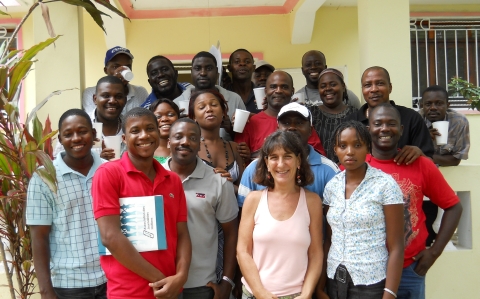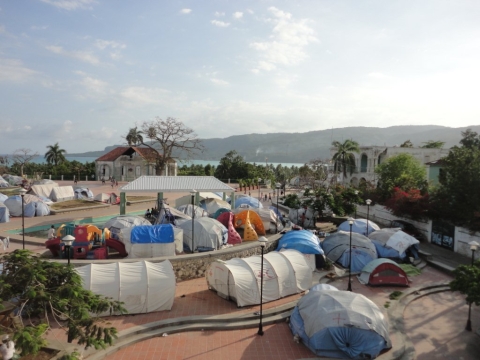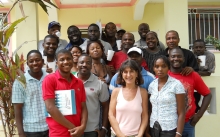
Knight Fellow Kathie Klarreich is surrounded by the Haitian journalists, proudly showing their certificates of completion.

A tent camp for refugees remains in the center of the town, more than a year after the January 2010 earthquake that devastated Haiti.

Knight Fellow Kathie Klarreich is surrounded by the Haitian journalists, proudly showing their certificates of completion.
The training exposed a type of journalism that the participants readily admitted was foreign to them. Most are self-taught and employed as ‘correspondents’ for radio stations in the capital. As such, they report on what is happening locally, for which they receive a stipend, often not more than $30 a month for however many reports they file. For the most part, their reports consist of little more than an overview of a topic and a sound bite.
The superficiality of the reports is understandable. In order to make ends meet they have other jobs, which may or may not include working for the local media in the seaside town of Jacmel. So they have to squeeze their reporting in between other obligations. Given the logistical and physical constraints along with other restrictions that go with the terrain – lack of access to information and resources – it was surprising to see that they were willing to give up four consecutive weekends to sit in a hot room that often lacked power to run the two fans.
Yet there they were, every Saturday and Sunday, brimming with enthusiasm, good humor (Haiti has no shortage of that, despite all) and a clear thirst for knowledge. Their discussions were liveliest when they touched on local issues, which were mirrored in the topics they chose for their investigative reports: Why someone without any experience was chosen for a scholarship to visit Japan? Why the stand for Carnival was still not dismantled nearly two months after Mardi Gras? Why was Jacmel considered the national hub for artists?

Knight Fellow Kathie Klarreich is surrounded by the Haitian journalists, proudly showing their certificates of completion.
Several people chose larger issues: What happened to cholera patients at the local hospital when Doctors Without Borders pulled out? Why was it that the local water agency of the government wasn’t distributing water to everyone? The journalists presented their reports and the discussions that followed about what did and didn’t work seemed to bring the lessons home. The trainers, who included the president of the Haitian Journalists Association, Jacques Desrosier, and Pierre Manigat, professor and former editor of the country’s only daily newspaper, displayed a sensitive balance of encouragement and criticism, pushing for more specifics, more verification and more color. The first two weeks focused on basic journalism skills, the last two on what makes an investigative report different from a conventional one, and why.
As one of the journalists said after his investigative report was thoroughly dissected, “The fact that I didn’t succeed has allowed me to learn more than if I did.”
On some level, I feel the same. It took me nearly eight months of my Fellowship to get this program off the ground. It has proven to be worth the wait. My 25 years of experience here was a foundation, but I still needed to do my homework to know what was possible.
The next four-week training will be in the cholera ravaged town of St. Marc. From there, funding notwithstanding, I’m hoping to schedule trainings in Mirogoane and Au Cayes in the south, Ouanaminthe in the far north and Gonaives along the western coast. The ultimate goal is to put together an association of investigative journalists. At the very least, I hope to hook them up with each other so that their network of information, sourcing, and verification is greater.
I’m not expecting miracles. The constraints as well as lack of experience make investigative reporting here an ongoing challenge. But there are now 22 more people who understand what investigative reporting means, and why pursuing it is so important.